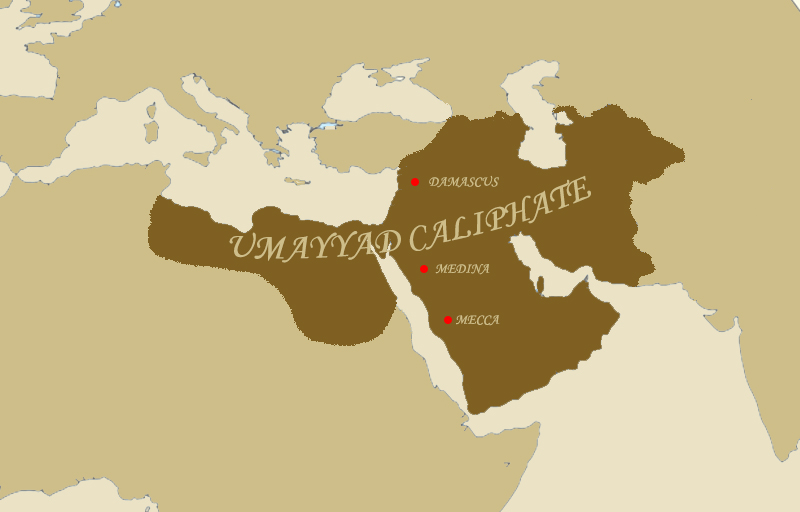Who is Muawiyah ?
Holy Prophet (S) absolutely despised the Bani Umayyah. So much so that he had even cursed this clan. The accursed tree in the Holy Quran denotes Bani Umayyah according to the unanimous view of the interpreters of Quran. The Holy Prophet (S) says: “I dreamt that Bani Umayyah were jumping on my pulpit like monkeys.”1
I have also described how Bani Umayyah became the rulers of Shaam (Syria) and how the Arab Kingdom passed into their hands. The Holy Prophet (S), after ten years of efforts, had left Bani Umayyah so weak that now there remained no capacity for them to create mischief. But in order to save their Caliphate, Abu Bakr and Umar made the Chief of this tribe, Abu Sufyan, the ruler of Shaam. Since Abu Sufyan could not move to Shaam himself, his elder son, Yazeed Ibn Abu Sufyan was appointed the governor of Shaam. He died within a period of four years and Muawiyah took his position.
With this, began the worldly ascendancy of Bani Umayyah and its main promoters were Abu Bakr and Umar. Similarly, the two were also responsible for all the calamities that visited the family of the Messenger (S). Muawiyah is the fifth Caliph of Ahlul Sunnat. He became a Caliph by use of force, but the condition of consensus was also present in him. Below we describe the traits of Muawiyah:
On page 194 of Tarikhul Khulafa and in Izalatul Khifa, it is written that Muawiyah said: “Since the Prophet told me that when you become a king be kind to the subjects, I always vied for rulership.”
Indeed, whatever kindness he might have done to common people, he was indeed very kind to the family of the Prophet after he became the ruler! The reward of this kindness will definitely, be given to him on the Day of Recompense by Ali (a.s.), Hasan (a.s.) and their numerous companions. The Prophet must have learnt through divine intuition, what Muawiyah was about to do, that is why he told him to be kind to the creatures of Allah.
Jabir bin Saad is reported to have said in Sahih Muslim2 that Muawiyah asked Saad bin Abi Waqqas why he did not curse Ali (a.s.)? It is also written in Asaatul Labeeb that Muawiyah forcibly told people not to relate any tradition in favor of Ali (a.s.) and no one should narrate any tradition from that person. Tarikh Abul Fida3 says:
In the initial period of the Caliphate of Imam Hasan (a.s.), in 41 A.H. upto 99 A.H., the Bani Umayyah Caliphs recited curses on Ali (a.s.) from pulpits till Umar Ibn Abdul Aziz discontinued the practice.4
It is also written in Tarikh Abul Fida5 that the agents of Muawiyah used to recite curse on Ali (a.s.) in the sermon of Friday prayers. In the same way, in Izalatul Khifa6 it is seen that Muawiyah told his officials: “You all force to curse Ali, anyone who praises him.” Thus, the preachers began to recite curse on Ali (a.s.) from the pulpits throughout the kingdom of Shaam. At that time, Shias of Kufa were under very perilous circumstances. No well-known Shia personality survived.
Muawiyah had written to his officers that if any Shia of Ali was in any government post, he should be expelled and he should not be paid any compensation. Anyone found having regard for Ali should be put to the sword and his house should be demolished. In those days, if a Shia visited another Shia, it was in an extremely secret manner. They would only open themselves up when they are absolutely certain they would not be exposed.
Masters were in fear of their slaves and maids and used to take oaths from them that they would not betray their Shia faith or they shall be destroyed. The time of the passing away of Imam Husayn (a.s.) was the most difficult period. They spent their life in dissimulation (Taqayyah). After the martyrdom of Imam Husayn (a.s.), Abdul Malik bin Marwan became the Caliph. The period was no better for Shias. The order of the Caliph was that people should practice hatred of Ali – as it was actual piety.
In Tarikhul Khulafa7 it is seen that the people of Shaam raised the pages of Quran as per the advice of Muawiyah. What an intelligent way to use the Quran! Muawiyah was indeed incomparable in deceitful ways. It is written on page 76 of Dar Asaatul Labeeb that Muawiyah started many innovations. The chief of them being kissing the Rukne Yamani8 in Kaaba and omitting Bismillaah (In the name of Allah…) etc.
The same book says, that when Imam Hasan (a.s.) passed away, Muawiyah said: “It was a spark that has now become silent.” Followers of Muawiyah must also consider Imam Hasan (a.s.) as a spark, and like their leader, should also celebrate the martyrdom of Imam Husayn (a.s.). If you really follow Muawiyah, you must act as he did. The Holy Prophet (S) would indeed intercede for such Muslims of Muawiyah on Judgment Day and their intercession is guaranteed. They must continue to follow Muawiyah.
Read more at Muawiyah Ibn Abu Sufyan | Misbah-uz-Zulam, Roots of the Karbala’ Tragedy | Al-Islam.org



Post a Comment